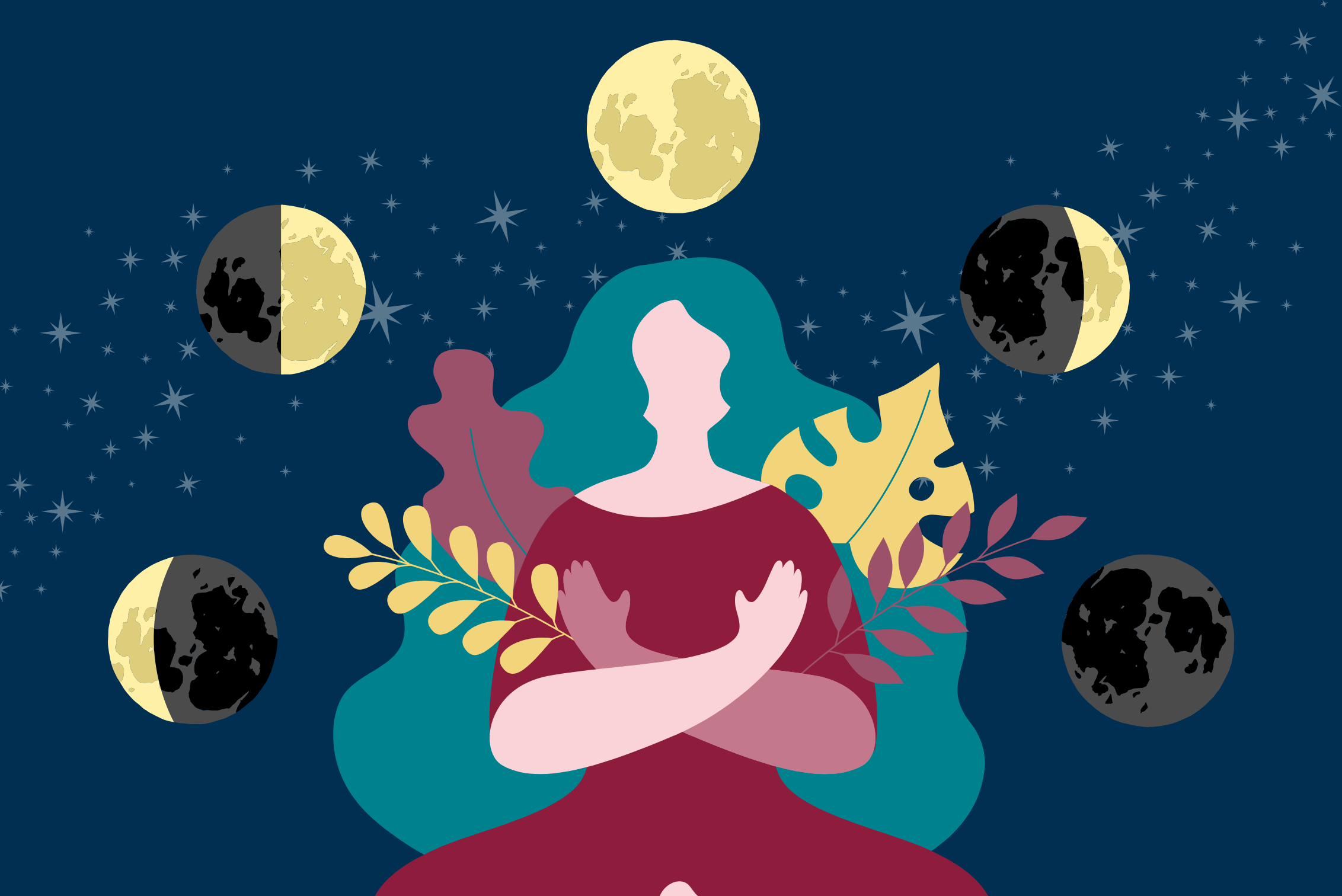From Pain to Power: Owning Your Rhythm!
Rethinking the Female Cycle with Emily Brocks
By Slava Denys
Illustration of a calm woman in a meditative state, embraced by the phases of the moon.
I had a special mission from the Career Club DK newsletter team: dive into the topic of the female cycle and how to make it work for us instead of against us. Honestly, I wasn’t sure who to talk to—until I met Emily Brocks. She flipped the whole thing for me, making me think not just about my body, but about my inner, spiritual self.
Emily’s an American-Dane who’s been in Denmark since 2002. She’s a pro at teaching and creating workshops on authenticity, body awareness, menstruality, and menopause in the workplace. Since 2010, she’s been lecturing at DIS on Gender Studies, including her course Is the Future Feminine? Beyond academia, Emily leads Kundalini yoga classes, Sacred Rest retreats, and school workshops through her company, GirlCollective. With a background in gender studies, social work, and certifications in yoga, coaching, and women’s circles, she’s the real deal.
The interview took place on a rainy day, and I completely mixed up the location—so, yeah, I was a bit stressed. But the moment I met Emily, all that just melted away. Suddenly, I felt calm, positive, and energised by her amazing light and soft, vivid energy.
Slava: There are so many clichés around the menstrual cycle. Yes, many women experience pain—everyone knows that. But there’s also a growing belief that this time can bring strength, heightened emotions, and bursts of energy. So, how can we help women use that power instead of losing five days every month? What are the smart ways to lean into the cycle, not just survive it?
Emily: Today, I offer workshops and courses on how we can live more in tune with our cycle. We know more today than just a few years ago about hormones, and in particular, what an important hormone estrogen is.. It works like a neurotransmitter, carrying messages from the brain to all different parts of the body. There are estrogen receptors all throughout the body, just waiting for the cycle to do its thing. As estrogen rises in the first part of the cycle, leading up to ovulation, all those systems love it.
In many ways, estrogen makes us “juicy”. Many of us sense this in the first part of the cycle—in the period after menstruation, and leading up to ovulation—where we feel energised, confident, creative, and innovative.
Then ovulation happens and we cycle into the premenstrual phase, and that’s where the common narrative kicks in—PMS, being moody, bitchy, all of that.
These mood shifts are because the drop in estrogen that happens after ovulation means we lose that juicy buffer in our bodies, and between us and the outside world.
So when that buffer thins out, the filter between us and everything else becomes much thinner.
And instead of thinking of it as being “bitchy,” I like to say—it’s our authentic voice coming out.
Let’s change the narrative to being about the fact that this part of the cycle is when the real me shows up.
I’ve experienced in myself - and in women who take my classes & workshops - that when we know we’re in that phase of our cycle, we can use these mood shifts to our advantage, with intention & reflection, changing how we interact with the world. It’s honest, it’s fierce—not bitchy.
Slava: So, do you mean that we can navigate the power which the cycle gives us?
Emily: In this busy world, we live on autopilot much of the time. So we have to slow down to learn how to navigate our cycles. Tracking is key. And it doesn’t have to be complicated. Sure, there are lots of apps, but it can also be as simple as writing down some words every day, like: “How was my day?” and “What does my body feel like today?” Because when we journal or use an app, we slow down, tune in, and get reflective. We give ourselves a chance to ask: what’s it actually like to be me today?
We need to start to notice patterns in how we feel at different parts of the month, which physiological symptoms keep coming back, such as why migraines hit four days into your cycle, and so on. There’s often a link between our symptoms and how we’re living during phases of the cycle.
For me, the biggest lesson I want to share is slowing down and tuning in. We can’t live authentically or access that fierce power the cycle gives us if we don’t listen. Otherwise, we end up always living in a reactive way, & mirroring the norms around us.
Slava: What advice can you give to women who are moving to a new culture, without their usual support networks or knowledge of social and cultural codes? How to slow down?
: Let’s take a real story: a colleague of mine has really painful periods. Every month she says, “I feel so bad,” but she never tells her boss, and she never stays home. She just works through it. I’m sure many people are like her.
Not all have pain like that, but many do. So, if they choose to go that route—keep working without telling the boss—what tips can help make it easier?
Emily: Yeah, if that’s the choice, one big thing to be aware of is that science now shows if we don’t slow down or take breaks when the pain is extreme, symptoms just get worse. The cycle is ‘stress-sensitive’ - so when we’re stressed, the body’s signals just get louder and louder. There are lots of studies showing that higher cortisol levels mean more symptoms—migraines, menstrual pain, stuff like that. You won’t break out of that pain cycle unless you start making different choices.
About your diet. Protein is your secret weapon.
Eating enough protein—around 20 grams per meal—is super important. It’s more than you think, and most people aren’t getting enough. And sugar? Yeah, it’s a problem. Studies show sugar can fire up cravings, especially because estrogen messes with how we digest it. So when you’re reaching for that late-day candy bar, your hormones might actually be tricking you.
Instead of fighting cravings with more sugar (which makes pain and inflammation worse), try supporting your body with solid fuel, like protein. Estrogen and progesterone have anti-inflammatory powers, but when they drop (think PMS or menopause), inflammation creeps in. That shows up as tiredness, bloating, poor sleep, sore bodies, and mood swings. Add stress, lack of movement, or a junky diet to the mix? Boom—everything gets worse.
So how much protein do you need?
Menstruating: 1g per kilo of body weight
We’re talking 20+ grams per meal for a 65 kg body, plus protein-rich snacks. That’s a lot more than a slice of toast with butter. Here’s how to get there:
Some go-to meal ideas:
Breakfast (overnight power bowl):
3 tbsp chia (5g) + 3 tbsp hemp seeds (9g) + protein powder + oat milk or water.
Top with almond/peanut butter, fruit, or cacao nibs.
Make a triple batch = easy breakfast and snacks for days!
Quick stuff for busy days:
Smoothie with Skyr + fruit + almond milk
Pre-boiled eggs (13g each)
Cottage cheese, Skyr, Greek yoghurt (great if you do dairy)
DIY trail mix: almonds, walnuts, pumpkin seeds, dried fruit, popcorn, dark chocolate—yum and useful.
Dinner:
Always aim for 20g of protein + veggies.
Examples:
Meat: 77g red meat or 87g chicken
Fish: 105g salmon
Vegetarian: 167g tofu or 242g chickpeas
Big shoutout to Cooking for Peanuts—great for recipes!
Now, let’s talk about sleep. Sleep is huge. Are you getting enough? Falling asleep easily? Staying asleep? If not, your body’s shouting at you to rest more. And no, rest isn’t just sleeping.
Try building “mini breaks” into your week—yes, even at work. Step outside for 5 minutes, breathe, get some light, and look at a tree. That’s creative rest.
And if you’ve got period pain, pelvic stretching, desk yoga, or gentle movement helps. Even just sitting and doing slow pelvic circles on a chair can release tension and ease symptoms.
Working through pain? We get it. But don’t power through the day nonstop. Create little pockets of rest—otherwise, your body’s going to scream louder next time. Long-term? That pressure cooker leads to burnout or chronic issues.
Slava: What about communication? Should we tell people around us when we’re on “those days”?
Emily: Honestly, it can help. You don’t have to tell everyone everything, but choosing who to share with matters. You don’t owe anyone an explanation, but being open with the right people can make a big difference. Just as important is having pockets of time with ‘life-giving’ people rather than only people who drain your energy (bosses, colleagues, partners, kids… no shade).
Slava: I know this is not an easy topic to bring up with HR or your boss (especially a male one). Any tips on how to approach this topic professionally?
Emily:
Start with: “Lately I’ve been feeling low-energy / not sleeping well / having pain, and it’s affecting my focus.” Menstrual health is just part of your wider wellbeing.
Be concrete. Everyone experiences it differently—even people who menstruate. Visuals can help:
“A hot flash in a meeting feels like stepping off a plane in Greece… in July.”
“Imagine getting punched in the same spot for days, but pretending you’re fine. That’s my menstrual pain at work.”
Ask: Can I work from home some days? Is there flexibility around sick leave? Is there a quiet room I can use? You’re not asking for favours—you’re giving them a chance to support you better.
Honestly, the cycle is a powerful reminder to take care of ourselves. It teaches us that self-care isn’t optional—it’s essential.
Here are a few recommendations for books you can read to explore the topic:
Alexandra Pope, Wild Power and Wise Power
Lara Briden, Period Repair Manual
Make it stand out
Whatever it is, the way you tell your story online can make all the difference.
Want to find out more or connect with Emily Brocks?


